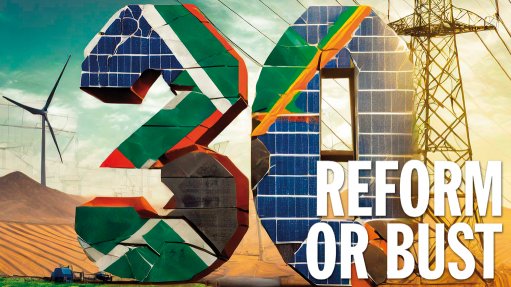A game of chicken
Are you familiar with the game of chicken? If you are not, you have definitely not seen near enough action movies.
It is inevitable for these movies to not include a scene where two individuals, normally the good guy and the bad guy (‘guy’ is not gender specific), are in cars racing towards each other at breakneck speed and on a collision course. One driver must swerve, or both drivers may die in the ensuing crash. However, if one driver swerves and the other driver does not, the driver who swerves will be called a ‘chicken’.
The game of chicken is not confined to cars racing towards each other – it is also applicable to economics. Yes, economics, where it is known as ‘the hawk-dove game’ or ‘the snowdrift game’. It is an influential model of conflict involving two players, where the principle of the game is that, while each player prefers not to yield to the other, the worst possible outcome occurs when both players do not yield.
So, is South Africa playing the game of chicken with the Americans? If it is, it can only end badly. At the moment, no one is swerving or has the slightest inclination or intention to do so. What I find most worrying is that South Africa really has nothing to gain in all this.
Media24 reported on October 20 that South Africa had missed its agreed deadline of October 15 for new animal health and food safety rules, which also affect US beef and pork exports. The source quoted a spokesperson for the US Trade Representative (USTR) as saying that, since South Africa had missed the deadline, Washington had no choice but to move on with a review of South Africa’s eligibility for trade benefits under the African Growth and Opportunity Act (Agoa), which was first signed into law on May 18, 2000. No deadline has been set to complete the review.
Agoa provides qualifying sub-Saharan African countries with customs-duty-free market access to the US on more than 4 600 products. However, on October 24, South Africa’s Department of Trade and Industry denied that it had missed the deadline, relating to an agreement on new animal health and safety rules, contending that the deadline had been missed by both countries. But then, who stands to be the biggest loser?
In December 2014, South Africa imposed a ban on the importation of US chicken, following an outbreak of bird flu. This, effectively, stopped all imports of US chicken, which, before the imposition of the ban, had been subject to antidumping duties since 1999 and ‘ordinary’ customs duties. When collectively applied, and taking the weakening rand into account, these measures effectively stopped all US chicken imports.
The elimination of trade barriers for US imports and investments is one of the criteria for eligibility for Agoa.
Media24 also reported that senators from the chicken-producing states of Delaware and Georgia are very disappointed at South Africa’s failure to open up its markets after agreeing in June this year to ‘drop’ antidumping duties on bone-in chicken meat.
Although the Agoa benefits were to expire on September 30, on June 25, the US Congress extended them for ten years when it passed the Agoa Extension and Enhancement Act of 2015. However, it is understood that South Africa was singled out, making its continued participation conditional on it providing greater access to its market for US poultry, beef and pork imports.
According to the USTR, South Africa does not meet the eligibility requirements under Agoa. It is estimated that, if it loses its Agoa access, South Africa could lose $1.7-billion (R23-billion) in export revenue each year. The South African government’s news agency, www.sanews.gov.za, reported on April 10 that Agoa is estimated to have created 62 000 jobs in South Africa and that, in 2014, South Africa exported R69-billion worth of products to the US. It is understood that these exports included about 60 000 motor vehicles, and that these exports had helped to turn a merchandise trade deficit with the US into a trade surplus of about R12-billion. This is significant, considering that, with few exceptions, South Africa reports persistent monthly merchandise trade balance deficits. South Africa manages a merchandise trade balance surplus with only the US (owing to Agoa) and Africa.
Then there is the Promotion and Protection of Investment Bill (PPIB), with whose enactment the DTI is forging ahead and about which the US has voiced concern.
According to Norton Rose Fulbright, South Africa’s trading partners have expressed a number of concerns about the Bill, such as the fact that it contains exclusions of what actions might constitute expropriation, it states that the amount of compensation payable for an expropriated investment must be ‘just and equitable’, rather than the fair market value of the expropriated asset. Further, it does not contemplate the possibility of compulsory recourse to international arbitration as a means of resolving disputes, and does not include the specific ‘fair and equitable treatment’ provisions that are common in many bilateral investment treaties.
There is also the Private Security Industry Regulation Amendment Bill of 2012 (PSIRA), which now awaits Presidential assent to become law and could prove troublesome in terms of South Africa-US relations. Section 20 of PSIRA stipulates that private security companies that operate in South Africa must be at least 51% South African-owned. This has raised fears that companies could be forced to sell interests at ‘fire sale’ prices, thereby undermining employment and foreign direct investment.
So, given South Africa’s provocative approach to Agoa, the PPIB, and the PSIRA, will its chickens be coming home to roost? (This expression first appeared in print in 1390, when Geoffrey Chaucer used it in The Parson’s Tale: “And ofte tyme swich cursynge wrongfully retorneth agayn to hym that curseth, as a bryd that retorneth agayn to his owene nest.”)
Environment Levy for Tyres
On October 7, the South African Revenue Service informed of the proposed imposition of an environmental levy on tyres (Schedule No 1, Part 3E, of the Customs and Excise Act, 1964) with effect from April 1, 2016. Comment on this matter is due by November 27.
According to the notice, Finance Minister Nhlanhla Nene, in his Budget speech on February 25, announced the implementation of additional environmental levies on a range of waste streams to assist in diverting waste from landfills towards reuse, recycling and recovering. As a first step, government proposed a tyre levy to be implemented under the Customs and Excise Act, 1964.
Comments
Press Office
Announcements
What's On
Subscribe to improve your user experience...
Option 1 (equivalent of R125 a month):
Receive a weekly copy of Creamer Media's Engineering News & Mining Weekly magazine
(print copy for those in South Africa and e-magazine for those outside of South Africa)
Receive daily email newsletters
Access to full search results
Access archive of magazine back copies
Access to Projects in Progress
Access to ONE Research Report of your choice in PDF format
Option 2 (equivalent of R375 a month):
All benefits from Option 1
PLUS
Access to Creamer Media's Research Channel Africa for ALL Research Reports, in PDF format, on various industrial and mining sectors
including Electricity; Water; Energy Transition; Hydrogen; Roads, Rail and Ports; Coal; Gold; Platinum; Battery Metals; etc.
Already a subscriber?
Forgotten your password?
Receive weekly copy of Creamer Media's Engineering News & Mining Weekly magazine (print copy for those in South Africa and e-magazine for those outside of South Africa)
➕
Recieve daily email newsletters
➕
Access to full search results
➕
Access archive of magazine back copies
➕
Access to Projects in Progress
➕
Access to ONE Research Report of your choice in PDF format
RESEARCH CHANNEL AFRICA
R4500 (equivalent of R375 a month)
SUBSCRIBEAll benefits from Option 1
➕
Access to Creamer Media's Research Channel Africa for ALL Research Reports on various industrial and mining sectors, in PDF format, including on:
Electricity
➕
Water
➕
Energy Transition
➕
Hydrogen
➕
Roads, Rail and Ports
➕
Coal
➕
Gold
➕
Platinum
➕
Battery Metals
➕
etc.
Receive all benefits from Option 1 or Option 2 delivered to numerous people at your company
➕
Multiple User names and Passwords for simultaneous log-ins
➕
Intranet integration access to all in your organisation


















